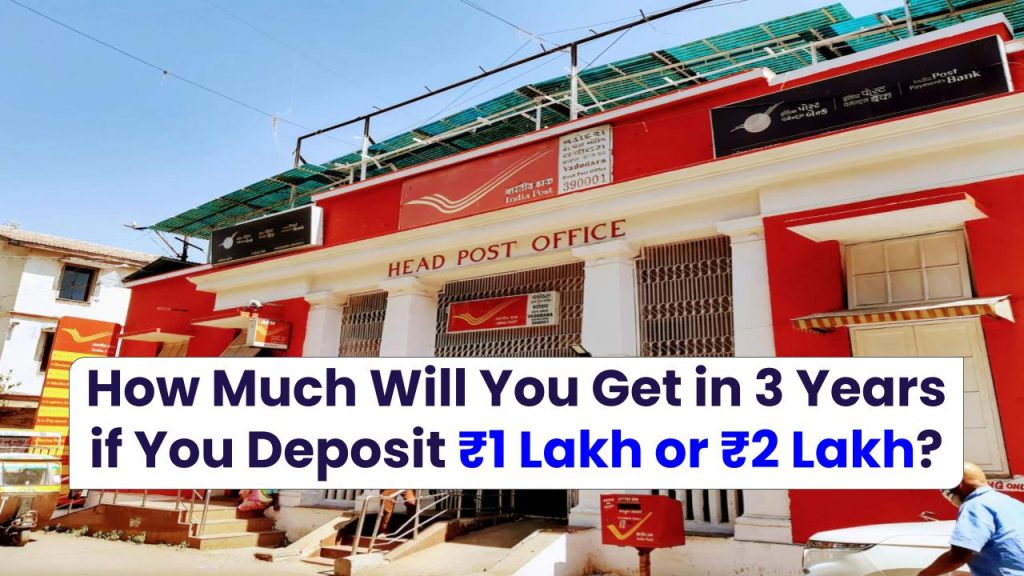
If you’re looking for a safe and guaranteed return on your investment, the Post Office Fixed Deposit (FD) Scheme is one of the best options available in India today. But many people still wonder: How much money will I get in 3 years if I deposit ₹1 lakh or ₹2 lakh in Post Office FD? The answer depends on the interest rate and how it’s compounded.
In this article, we’ll break down the current Post Office FD interest rates, do real-life calculations, and help you understand how much return you’ll get on your money over 3 years. Whether you’re a student, a salaried individual, or a senior citizen, this guide is simple enough for beginners yet detailed enough for professionals and finance enthusiasts.
Post Office FD
| Feature | Details |
|---|---|
| Scheme Name | Post Office Time Deposit (Fixed Deposit) |
| Tenure | 3 Years |
| Interest Rate (as of Q1 FY 2025) | 7.1% per annum (compounded quarterly) |
| Deposit Amount Example 1 | ₹1,00,000 |
| Maturity Amount (After 3 Years) | ₹1,23,661 |
| Deposit Amount Example 2 | ₹2,00,000 |
| Maturity Amount (After 3 Years) | ₹2,47,322 |
| Official Website | India Post – Savings Schemes |
If you’ve been asking “How much will I get if I invest ₹1 lakh or ₹2 lakh in a Post Office FD for 3 years?” — now you know the answer.
You’ll earn ₹23,661 on ₹1 lakh and ₹47,322 on ₹2 lakh at the current interest rate of 7.1% per annum. It’s one of the most secure and steady investment options out there—perfect for those who want peace of mind and stable returns.
What Is a Post Office Fixed Deposit (FD)?
The Post Office FD, officially known as the Post Office Time Deposit Account (TD), is a government-backed investment scheme offered by India Post. It allows you to invest a lump sum for a fixed tenure and earn guaranteed interest.
The interest rate is set by the Ministry of Finance and is revised quarterly. As of March 2025, the rate for a 3-year deposit stands at 7.1% per annum, compounded quarterly. This makes it a safe and reliable option for conservative investors who want assured returns without market risk.
see also: PNB Fixed Deposit Interest Rate: If You Deposit ₹2,00,000 in a 12-Month FD in PNB
Post Office FD Interest Rates (Q1 FY 2025-26)
Here are the current interest rates for Post Office FDs:
| Tenure | Interest Rate (p.a.) |
|---|---|
| 1 Year | 6.9% |
| 2 Years | 7.0% |
| 3 Years | 7.1% |
| 5 Years | 7.5% (with tax benefits under 80C) |
How Much Will You Get in 3 Years?
Let’s now answer the big question: How much return will you get if you invest ₹1 lakh or ₹2 lakh in a Post Office FD for 3 years?
Example 1: ₹1 Lakh Investment
- Tenure: 3 Years
- Interest Rate: 7.1% (compounded quarterly)
- Quarterly Rate: 7.1% ÷ 4 = 1.775%
Using the formula for compound interest:
Maturity Amount = ₹1,00,000 × (1 + 0.01775)^12 ≈ ₹1,23,661
Interest Earned = ₹23,661
Example 2: ₹2 Lakh Investment
Same formula, but with double the investment:
Maturity Amount = ₹2,00,000 × (1 + 0.01775)^12 ≈ ₹2,47,322
Interest Earned = ₹47,322
These amounts are rounded for clarity but are accurate for practical use.
Who Should Invest in a Post Office FD?
Post Office FDs are ideal for:
- Senior citizens looking for safe returns
- Parents saving for short-term education goals
- Small investors who prefer fixed returns
- Professionals who want to diversify their portfolio safely
You don’t need a bank account to open it—just walk into your nearest India Post Office with valid KYC documents.
How to Open a Post Office FD in 2025
Step-by-Step Guide:
- Visit your nearest post office or go online at India Post.
- Fill out the Post Office Time Deposit Account opening form.
- Submit Aadhaar, PAN card, and address proof.
- Deposit a minimum of ₹1,000 (and in multiples of ₹100).
- Choose your tenure – in this case, 3 years.
- Collect your receipt or passbook with all investment details.
You can also open joint accounts, and nomination is allowed.
Tax Rules You Should Know
- TDS (Tax Deducted at Source) is applicable if interest earned exceeds ₹40,000 per year (₹50,000 for seniors).
- No 80C deduction is available for 3-year deposits. Only 5-year FDs qualify under Section 80C.
- Interest is fully taxable as per your income slab.
Tip: If you’re investing a large amount, break it into smaller FDs to manage tax better.
Pros and Cons
Pros:
- Guaranteed by Government of India
- Competitive interest rates
- Safe for risk-averse investors
- Quarterly compounding increases effective yield
Cons:
- Interest is taxable
- Premature withdrawal attracts penalties
- No monthly income option (unlike MIS scheme)
Premature Withdrawal Rules
You can withdraw your FD after 6 months, but:
- If withdrawn before 1 year, only savings account interest is paid.
- If withdrawn after 1 year, interest is 1% less than the applicable rate.
This makes it less flexible than a bank savings account—but much more rewarding if you stay invested till maturity.
see also: Here’s a Detailed Guide on the Best Interest Rates in 2025
Post Office FD FAQs
Q1. Can I invest more than ₹2 lakh in Post Office FD?
Yes. There is no maximum limit for investment. You can invest ₹5 lakh, ₹10 lakh, or more.
Q2. Can I open a Post Office FD online?
You need to have a post office savings account with internet banking enabled. Then, you can open FD accounts online at India Post’s Internet Banking Portal.
Q3. Is the interest rate guaranteed for 3 years?
Yes. The rate is locked in at the time of investment and remains fixed for the entire 3-year period.
Q4. What if the interest rate changes after I invest?
Your FD will continue to earn the original rate (e.g., 7.1%) even if new rates are lower or higher.
Q5. Can I take a loan against my FD?
Yes. You can avail a loan against your Post Office TD, making it a useful backup for emergencies.











